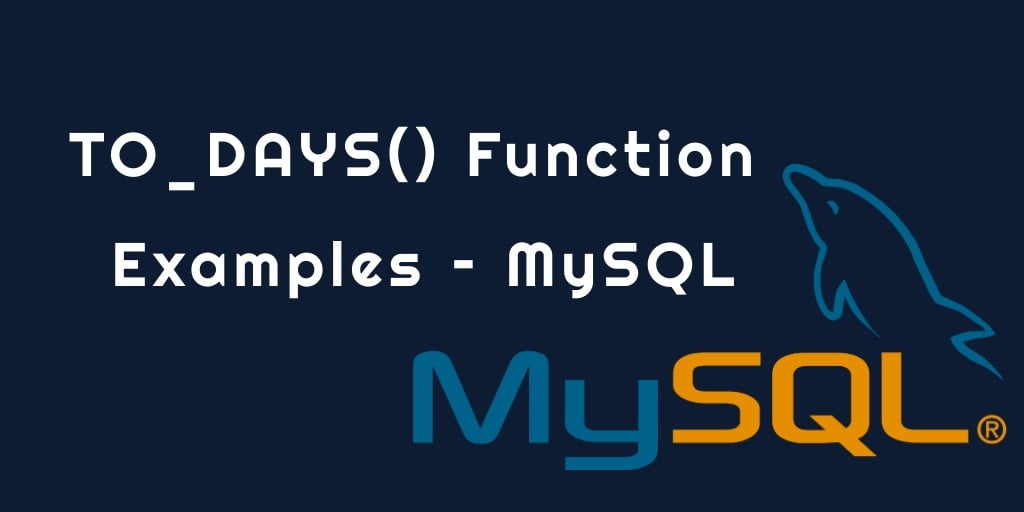MySQL TO_DAYS() Function; Through this tutorial, we would love to share with you how to use MySQL TO_DAYS() function with the help of examples. T
MySQL TO_DAYS() Function
Using the TO_DAYS () function in MySQL, to know how many days have elapsed since 0 days for a particular date. For e.g., you can give this function today’s date, and how many days it will return for 0 days.
Syntax of MySQL TO_DAYS() Function
The basic syntax of MySQL to_days() is:
TO_DAYS(date)
Here is the date of use in date calculations.
Now we take a few examples for demonstration
Example-1
We take the first example of the to_day functions for demostration.
SELECT TO_DAYS('2000-12-31');
Output-1
+-----------------------+
| TO_DAYS('2000-12-31') |
+-----------------------+
| 730850 |
+-----------------------+
Note: Note however that the MySQL documentation advises that this function is not for use with those values that were before the arrival of the Gregorian calendar (1582).
Example-2
Next, we take the second example with a curdate() of MySQL.
SELECT
CURDATE(),
TO_DAYS(CURDATE());
Output-2
+------------+--------------------+ | CURDATE() | TO_DAYS(CURDATE()) | +------------+--------------------+ | 2019-07-16 | 737621 | +------------+--------------------+
First of all, we use the MySQL CURDATE () function to return the current date, after that, we pass that function to the TO_DAYS () function to return the number of days that day 0 is.
Example-3
TO_DAYS() v/s FROM_DAYS()
Contrary to the FROM_DAYS () function TO_DAYS (), which returns the number of days, given a date. Here’s an example to display the relationship between FROM_DAYS () and TO_DAYS () functions:
SELECT
CURDATE(),
TO_DAYS(CURDATE()),
FROM_DAYS(TO_DAYS(CURDATE()));
Output-3
+------------+--------------------+-------------------------------+ | CURDATE() | TO_DAYS(CURDATE()) | FROM_DAYS(TO_DAYS(CURDATE())) | +------------+--------------------+-------------------------------+ | 2019-07-16 | 737621 | 2019-07-16 | +------------+--------------------+-------------------------------+
So in this example, we use TO_DAYS () to return the number of days from the current date. Then I use FROM_DAYS () to return the date from that value (which, as expected, returns to the original value of CURDATE ()).
Example-4
we take another example with a now() function of MySQL. Before we use curdate() function of mysql with to_days function. Curdate() is used to return the current date and now() is used to return the current date with time.
SELECT
NOW(),
TO_DAYS(NOW());
Output-4
+------------------------+--------------------+ | NOW() | TO_DAYS(CURDATE()) | +------------------------+--------------------+ | 2019-07-16 18:10:45 | 737621 | +------------+--------------------------------+
First of all, we use the MySQL NOW() function to return the current date and time value, after that, we pass that function to the TO_DAYS () function to return the number of days that day 0 is.
Recommended Post
Conclusion
Here, you have learned how to use MySQL TO_DAYS() function. You have also learned different FROM_DAYS () and TO_DAYS () function of MySQL.
Recommended MySQL Tutorials
If you have any questions or thoughts to share, use the comment form below to reach us.
